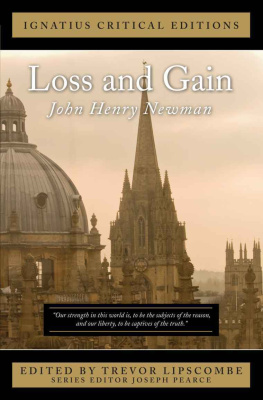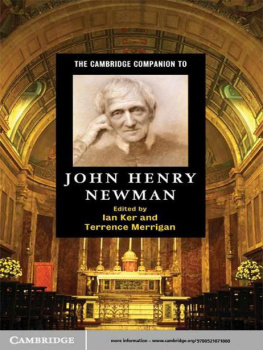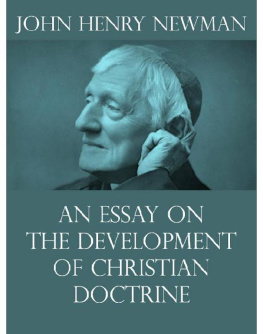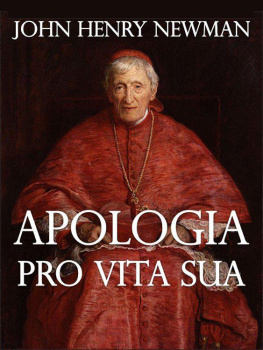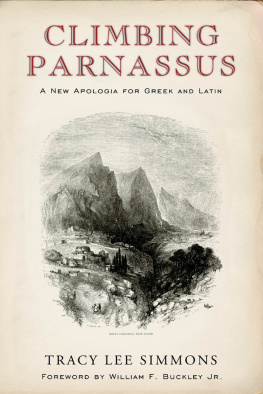
APOLOGIA PRO VITA SUA
JOHN HENRY NEWMAN was born in 1801 and educated privately at Ealing School and Trinity College, Oxford. Elected a Fellow of Oriel in 1822, he became vicar of the university church of St Marys in 1828. In 1833 he began the Tracts for the Times, but after his controversial Tract 90, which attempted to interpret the 39 Articles of the Church of England in a Catholic sense, he retired in 1842 to monastic seclusion at Littlemore. Without completing his Essay on the Development of Christian Doctrine, he was received in 1845 into the Roman Catholic Church. Ordained a priest in 1847, he founded the Birmingham Oratory in 1848. In 1851 he was appointed first rector of the Catholic University of Ireland (resigning in 1858), and his Dublin lectures and articles were eventually published as The Idea of a University. His theological autobiography, Apologia Pro Vita Sua, appeared in 1864 in response to a public attack by Charles Kingsley. His poem on the afterlife, The Dream of Gerontius, was published in 1865 and later inspired Elgars musical masterpiece. In 1870 he finally completed his philosophical justification of religious faith in An Essay in Aid of a Grammar of Assent. Created a cardinal in 1879, he died in 1890. He was declared Venerable in 1991.
IAN KER teaches theology at Oxford, having previously taught both theology and English at universities in Britain and the United States. He is the author and editor of twenty books, mostly on Newman, including John Henry Newman: A Biography (1988) and The Catholic Revival in English Literature 18451961 (2003).
JOHN HENRY NEWMAN
Apologia Pro Vita Sua
Edited by IAN KER
PENGUIN BOOKS
PENGUIN BOOKS
Published by the Penguin Group
Penguin Books Ltd, 80 Strand, London WC2R 0RL , England
Penguin Putnam Inc., 375 Hudson Street, New York, New York 10014, USA
Penguin Books Australia Ltd, 250 Camberwell Road, Camberwell, Victoria 3124, Australia
Penguin Books Canada Ltd, 10 Alcorn Avenue, Toronto, Ontario, Canada M4V 3B2
Penguin Books India (P) Ltd, 11 Community Centre, Panchsheel Park, New Delhi 110 017, India
Penguin Books (NZ) Ltd, Cnr Rosedale and Airborne Roads, Albany, Auckland, New Zealand
Penguin Books (South Africa) (Pty) Ltd, 24 Sturdee Avenue, Rosebank 2196, South Africa
Penguin Books Ltd, Registered Offices: 80 Strand, London WC2R 0RL , England
www.penguin.com
First published 1994
Reprinted 2004
13
Introduction and Notes copyright Ian Ker, 1994
All rights reserved
The moral right of the editor has been asserted
Except in the United States of America, this book is sold subject to the condition that it shall not, by way of trade or otherwise, be lent, re-sold, hired out, or otherwise circulated without the publishers prior consent in any form of binding or cover other than that in which it is published and without a similar condition including this condition being imposed on the subsequent purchaser
ISBN: 978-0-14-192207-2
JOHN HENRY NEWMAN
Apologia Pro Vita Sua
Edited by IAN KER
CONTENTS
CHAPTER I
History of my Religious Opinions up to 1833
CHAPTER II
History of my Religious Opinions from 1833 to 1839
CHAPTER III
History of my Religious Opinions from 1839 to 1841
CHAPTER IV
History of my Religious Opinions from 1841 to 1845
CHAPTER V
Position of my Mind since 1845
ABBREVIATIONS
Newman collected his works in a uniform edition of thirty-six volumes (186881). Until his death in 1890 he continued making minor textual changes in reprints of individual volumes, all of which from 1886 were published by Longmans, Green and Co. of London. Unless otherwise stated, all references are to volumes in the uniform edition published after 1890 by Longmans, except that references to the Apologia are to this Penguin edition.
Apo. | Apologia Pro Vita Sua |
Ari. | The Arians of the Fourth Century |
Ath. i, ii | Select Treatises of St Athanasius, 2 vols. |
AW | John Henry Newman: Autobiographical Writings, ed. H. Tristram (London and New York: Sheed and Ward, 1956) |
Corr. | Correspondence of John Henry Newman with John Keble and Others, 18391845, ed. at the Birming-ham Oratory (London: Longmans, 1917) |
DA | Discussions and Arguments on Various Subjects |
Dev. | An Essay on the Development of Christian Doctrine |
Diff. i, ii | Certain Difficulties felt by Anglicans in Catholic Teaching, 2 vols. |
Ess. i, ii | Essays Critical and Historical, 2 vols. |
HS i, ii, iii | Historical Sketches, 3 vols. |
Jfc. | Lectures on the Doctrine of Justification |
LD | The Letters and Diaries of John Henry Newman, ed. C.S. Dessain et al., vols, ivi (Oxford: Clarendon Press, 197884), xixxii (Edinburgh: Nelson, 196172), xxiiixxxi (Oxford: Clarendon Press, 19737) |
Mir. | Two Essays on Biblical and Ecclesiastical Miracles |
Moz. i, ii | Letters and Correspondence of John Henry Newman during his Life in the English Church, ed. A. Mozley, 2 vols. (London: Longmans, 1891) |
MD | Meditations and Devotions of the Late Cardinal Newman (London: Longmans, 1893) |
OS | Sermons Preached on Various Occasions |
PS iviii | Parochial and Plain Sermons, 8 vols. |
US | Fifteen Sermons Preached before the University of Oxford |
VM i, ii | The Via Media,2 vols. |
VV | Verses on Various Occasions |
Ker | Ian Ker, John Henry Newman: A Biography (Oxford: Clarendon Press, 1988) |
INTRODUCTION
1 The Background, Composition, and Reception of the Apologia
On 30 December 1863 Newman received in the post a copy of the January number of Macmillans Magazine. It was sent (anonymously) by William Pope, a Catholic priest in Yorkshire and a former Anglican clergyman who had himself been converted by Newmans writings (curiously enough, he was a nephew of Richard Whately, the fellow of Oriel whose formative influence on Newman is generously acknowledged in the Apologia but who was to become an inveterate opponent of all that his former disciple stood for). The issue contained an enthusiastic review by Charles Kingsley of J. A. Froudes anti-Catholic History of England in which various passages had been marked in pencil, including the following words that have become celebrated because of the book they inspired, or rather provoked:
Truth, for its own sake, had never been a virtue with the Roman clergy. Father Newman informs us that it need not, and on the whole ought not to be; that cunning is the weapon which Heaven has given to the saints wherewith to withstand the brute male force of the wicked world which marries and is given in marriage. Whether his notion be doctrinally correct or not, it is at least historically so.
Next page

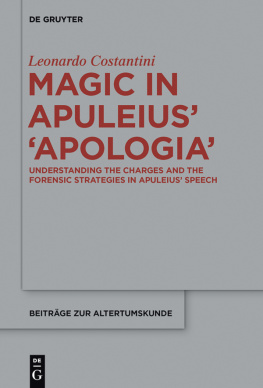
![Blessed John Henry Newman - Blessed John Henry Newman Collection [26 Books]](/uploads/posts/book/371011/thumbs/blessed-john-henry-newman-blessed-john-henry.jpg)
